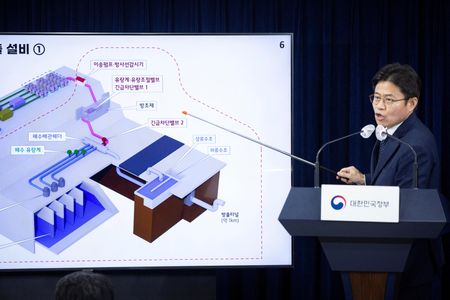 1
1 1
1
By Hyonhee Shin
SEOUL (Reuters) – South Korean nuclear safety experts who visited Japan’s wrecked Fukushima nuclear power plant said on Wednesday that detailed analysis was needed to verify Japan’s plan to release tonnes of contaminated water from it into the sea.
The Fukushima Daiichi nuclear station, about 220 km (130 miles) northeast of Tokyo, was destroyed by a magnitude 9.0 earthquake and tsunami in 2011, triggering three reactor meltdowns.
Japan plans to dump more than one million tonnes of contaminated water that was mainly used to cool the reactors into the sea by around this summer, triggering alarm at home and abroad, especially in fishing communities.
“Given our closest location, we are reviewing whether Japan has an appropriate discharge plan from a scientific and technological standpoint,” Yoo Guk-hee, chairman of the Nuclear Safety and Security Commission, who led a delegation on a site visit last week, told a briefing.
The Japanese utility responsible for the plant, and the Japanese government, say the water is safe after being treated, filtered and diluted though it does contain traces of tritium.
Yoo said there had been progress in checking facilities and securing samples and documents but further work was needed to reach any conclusion about the water’s safety.
“Additional detailed analysis and checks are required,” he said.
The 21-member South Korean team had focused during its six-day trip on water purification, transport and release equipment, as well as sampling and analysis facilities.
The visit came days after President Yoon Suk Yeol and Japanese Prime Minister Fumio Kishida held a summit in Seoul this month amid a thaw in relations following years of tension between the neighbours, both important U.S. allies.
The International Atomic Energy Agency is also conducting a safety review of Japan’s plan to release the water. It is expected to announce its results in coming weeks.
(Reporting by Hyonhee Shin; Editing by Robert Birsel)